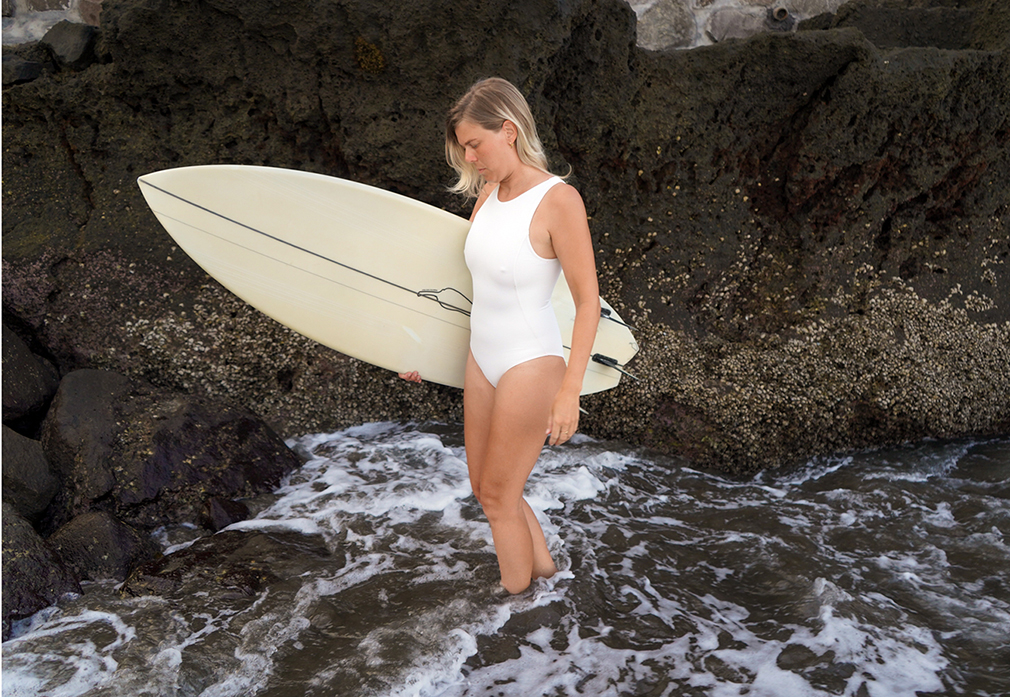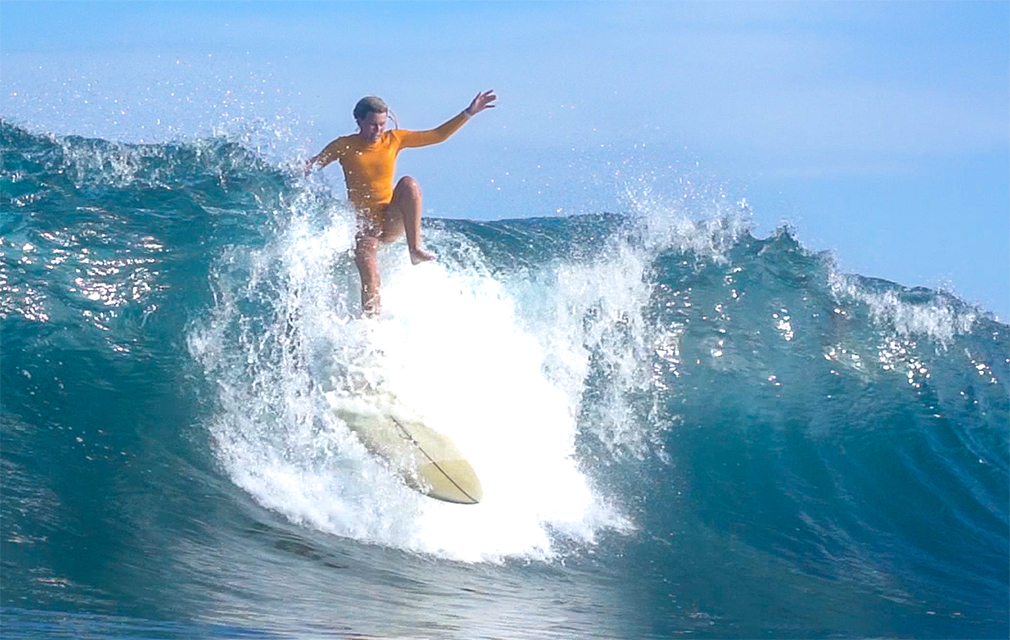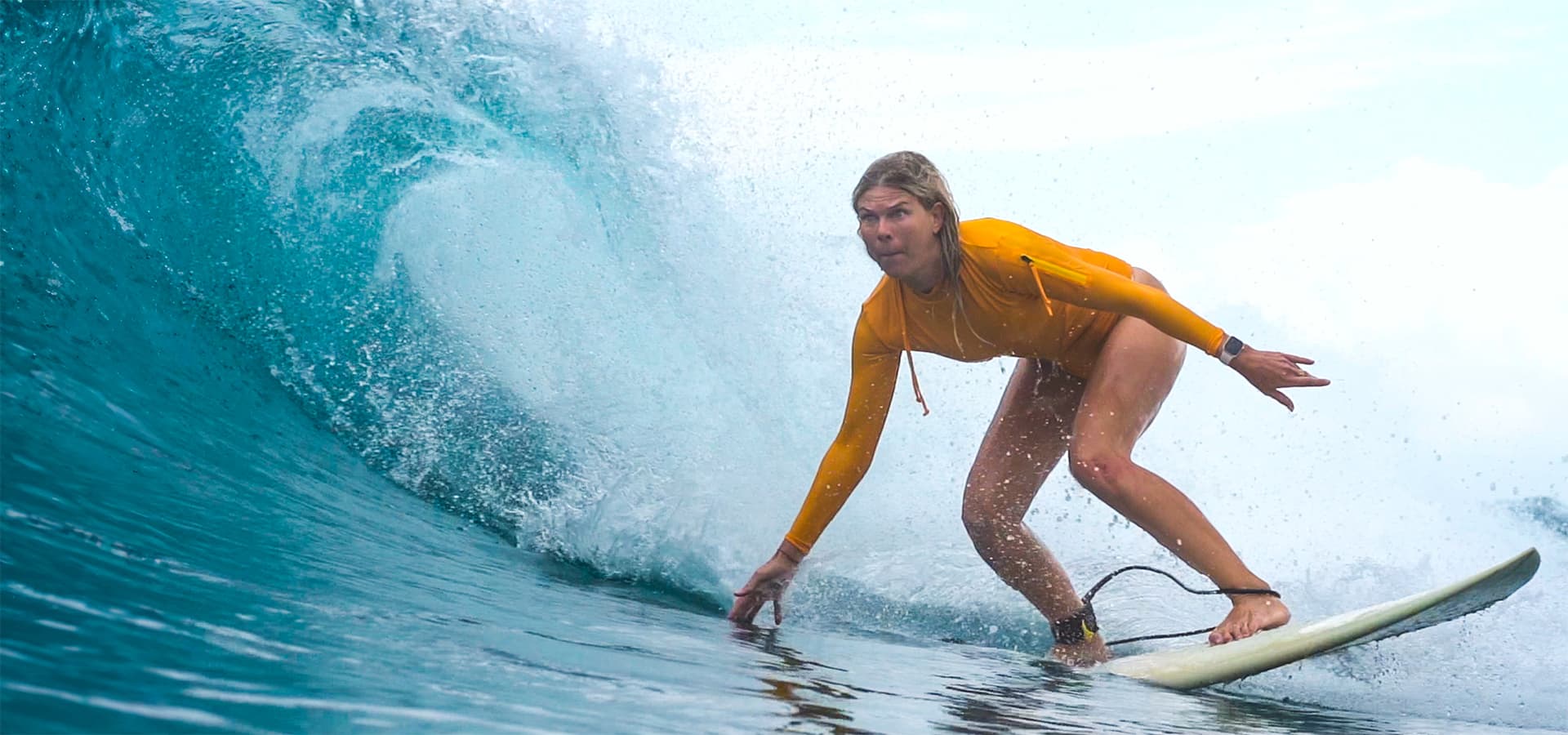Sweden-born, Bali-based Lisa Davidsson is a surf psychologist, a term she coined for herself and her business somewhat by accident in 2020. At the time, she was three years into living in Bali full-time, was on the brink of opening Coconut Corner, her three bungalow guesthouse outside Canggu, and was in a state of pandemic-induced life and career redirection.
Prior to the pandemic, she was certain she was on a path to specifically serving the stressed and burned out, a vision inspired by her own dance with stress and burnout. In 2016, she left a 10-year corporate career in privatized care in Sweden for the peace and beaches of Bali. Not long after that 7,000-mile move, she broke ground on Coconut Corner to become both her dream home and a place for her to host guests and clients for retreats and in-person one-on-one work.
But, just as her dream-come-true oceanfront oasis was set to open its doors for the first time, the borders in Indonesia, and everywhere, closed indefinitely. Untimely though it may have seemed then, it was the peaceful setting she chose for Coconut Corner, with its surfable waves just steps away, that caused Davidsson to find her way to the idea of bringing two of her passions together: surfing and therapy.
Again and again while out in the water surfing the emptiest waves she’d ever seen in Bali, she’d hear fellow surfers talk about feeling stuck in their surf progress or unable to get over a bad wipeout or some other traumatic event in the ocean. Being a surfer trained in clinical neuropsychology, she knew she could help, and better said, she knew she’d just found an even better direction for herself, her bungalows, and her career.
Fast forward four years and Lisa Davidsson is now exclusively a surf psychologist and has added certified hypnotherapist to the mix as well. She specializes in helping surfers overcome their fears, heal from surf and water-related trauma, build confidence on their board, and feel more comfortable in the lineup. Coconut Corner serves in all of the ways it was designed to, but now as a retreat center for Davidsson and others’ surf therapy programs, coaching, and retreats.
In this interview, we tap some of Davidsson’s expertise around overcoming the most common mental blocks surfers face. In her words, surfing is just another mirror for the struggles we face on land too. Heal what’s getting in the way of your surf and heal what’s getting in the way of your life in the process.

To the interview:
What would you say are some of the most common fears you see in the surfers you work with, even those with experience, and what advice do you have for those reading this who might share some of those fears?
What I see most are fears around some kind of condition, be it bigger waves, steeper waves, shallow reefs, rocks, etc. That and basically drowning, usually expressed as “being held under,” “the washing machine,” or “not getting air.” The best advice I have for those facing these fears is to take a slow, conscious approach to desensitizing yourself to what’s triggering you. That’s really the core of the work.
To do this, first define what your surf comfort zone is currently and then change just one or two things at a time. Desensitizing yourself to a trigger requires exposure, yes, but also a calm nervous system state as you’re exposing yourself. Don’t go surfing bigger waves in a new spot. Instead, surf slightly bigger waves in a spot you’re already familiar with first. Every change you make naturally brings about some stress. Don’t add new variables that you don’t have to.
As surfers, we’ve all had probably more than one memorable wipeout, and some of us, even an injury to recover from as a result. What’s the best way to get back out there after a traumatic event like this?
A specifically traumatizing event that causes severe pain or injury and maybe even loss of functionality, temporarily or not, can be highly emotional and mentally challenging. There are a lot of aspects of this that most are not even conscious of. For example, you might experience a lot more fear and stress as you face coming back to surfing…and it will likely show up in ways you are not expecting, too. Panic attacks are not at all uncommon, for example.
The first step is to properly process the emotions after the incident and as you go through the physical rehab. Supporting and taking care of the emotional side of the recovery will speed up the physical healing process as well. The second step for returning to surfing after a traumatic events that I wholeheartedly recommend is hypnotherapy. There really isn’t any therapeutic method, in my opinion, that is better suited for this.
Tell me more. What is hypnotherapy and why is it especially effective when dealing with the emotional effects of a bad wipeout or other traumatic event?
Hypnotherapy can come in many forms, but what makes it so effective is the way it allows us to work through whatever trauma we’ve been through while in a hypnotic state where we have access to the subconscious part of our mind. It’s this part that controls and automates most of our behaviour, all of our reactions, decisions, coping mechanisms, thoughts, and feelings about what we’re experiencing. They all actually originate from this part of our mind.
The style of hypnotherapy that I practice is basically a therapy session while under hypnosis. I use regression therapy to help clients go back to the root cause of what’s triggering them. We literally go back mentally to the original traumatic event. It could be a bad wipeout where you got held under, started to panic, and then thought you might die. In that moment your subconscious is completely rewired to the extent that you’re now experiencing surfing, or certain conditions, very differently, with seemingly automatic and uncontrollable bodily and emotional responses.
Hypnosis allows us to go back to the time of the event so that you can release all of the stored emotions and allow all of that pent up fear and panic to finally pass through you. Once that’s done, we go through the scenario again and re-program the subconscious to react differently to the same conditions the next time you find yourself in them. With the fear and panic gone, it’s much easier to face the same trigger differently and react to it differently too, from a place of peace and calm instead of fear and panic.
You can read more about how hypnotherapy works in more detail in this article I wrote: thesurfpsychologist.com/how-hypnotherapy-works.

What’s another mental exercise or technique you’ve found to be helpful when coaching surfers to stay calm and focused while waiting in the lineup or facing challenging waves?
Breathwork! No doubt about it. Learn to stay calm with the help of your breath. Specifically, that means learning how to breathe slowly and deeply, engaging your entire diaphragm. This will send a signal to your brain that you are actually safe because this kind of breathing doesn’t happen when you are in a fight-or-flight state. Being safe and believing you are safe triggers your nervous system to calm down too.
Let’s talk plateaus. What’s your best advice for overcoming plateaus in skill progression, especially when a surfer feels like they’re stuck or literally unable to improve?
First of all, I would shake things up. Go to a different spot, do a surf trip or hire a coach, try a new wave or a new board. Doing something different will give you a different perspective and also help you understand what it is that you actually need. Probably, it will also make you see that you’ve learned a lot and improved even when you didn’t think so. That positive boost will help you keep going and find your next level.
It sounds like confidence plays a part in breaking through a plateau. What can surfers do to build and maintain confidence in their abilities, especially when they’re out spicing things up, facing larger waves, more challenging breaks, or realizing they’re just not meeting their own expectations?
Confidence comes from self-awareness and self-trust. The self-awareness piece comes from being aware of your skills and knowing you can do what you set out to do. The knowing can be boosted with tools like visualization, preferably while in a meditative state or where you have more access to your subconscious, like in hypnotherapy. What you can do on your own is visualize yourself surfing the conditions you have yet to master. This will give you a stronger sense of awareness that you actually have the skills in that area already.
Secondly, you need to build self-trust. This comes from keeping your word to yourself and sticking to what you say you will do. If you lie to yourself, tend to self-abandon, or just keep not showing up for yourself, you will not trust yourself when it counts and you will not trust that you know how to handle a challenging situation. It’s as hard and easy as that.

How about some advice for holding your own in a crowded lineup? Can you speak to some of the more psychological dynamics that seem to get triggered when there are just too many surfers in the lineup?
Well, there is not one answer that is correct here. A crowded lineup can go a million ways depending on how the group reacts. When we get stressed, however, which a crowded lineup can certainly make us, we do tend to revert to our learned coping mechanisms and strategies, whatever those are.
For some, it will be avoidance and those surfers will simply leave or maybe just sit and wait on the shoulder. For others, it will be aggression – the fight response rather than the flight response. Egos start to enter the scene when the waves have to be shared with more people. Just remember that what you observe out there in a crowded lineup is rarely the full story and chances are most people out there are in their own head about something. I find that smiling, being kind, and talking to the people around you really helps to diffuse a tense lineup if that’s what you’re dealing with.
For strategies on how to deal with your own reaction to a crowded lineup, employ the same strategy as when you’re facing your fears, namely breathwork. Secondly, know that aggression displayed by others is likely due to their own inner stress levels and coping mechanisms rather than a reflection of something you or someone else did. It’s also really helpful to truly know yourself and to not take on the reactions of other people. The ability to do that, however, comes with a deep self-awareness and self-trust, or, said a different way, by letting go of your own ego first.
From a psychological perspective, what would you say are some of the mental health benefits that surfing offers beyond the thrill of the ride, and what would you say surfers can do to tap into these benefits more consciously and in their everyday life?
There is something about large bodies of water that seem to have a very positive impact on humans. There’s been lots of research on what exactly this is. One of the theories is that the open view to the horizon makes us relax and feel safe; the theory being that we can easily detect an approaching threat and hence our nervous system can relax better. This would be true for surfing and being out on the water on those calmer days, but not all surf will relax you, of course.
Being outside in nature, away from our screens, flashing lights, noise, concrete, etc. is another great benefit surfing brings to our nervous system, our mind, and our body. The constant busy-ness of society is draining, and few realize the extent to which it negatively impacts us. Getting away from that is a large part of the benefit we all experience with surfing, as is the state of presence it puts us in. You have to be there fully to see the waves coming, be in the right spot to catch them, or perhaps get out of the way when a big one rolls in. With all the distractions we have in modern day life, it’s rare to have time in your day when you are doing nothing but exactly that which you are supposed to be doing. This is great recovery time for your brain.
I’ve also found that there’s the benefit that your struggles in surfing mirror your struggles in life. Whatever you are conquering in your surf will help you conquer those same things on land. I’ve seen it again and again in the work I do with my clients. The ocean is not gentle, so it will make you face your shit and you can step up and do it and be better for it. Or stay stuck. The choice is yours. And this is where I would say all of us can more consciously reap the benefits of surfing. We can lean into this and face what we need to face through this magical and incredibly rewarding sport. We can rise and become better surfers and better human beings at the same time.
Lisa offers both group and private coaching services for surfers looking to take their surfing to the next level. Her next four-week immersive group coaching program begins November 18, 2024. Learn more and apply at thesurfpsychologist.com/coaching or schedule a free consultation to learn more about working with her one-on-one at thesurfpsychologist.com/booking.









